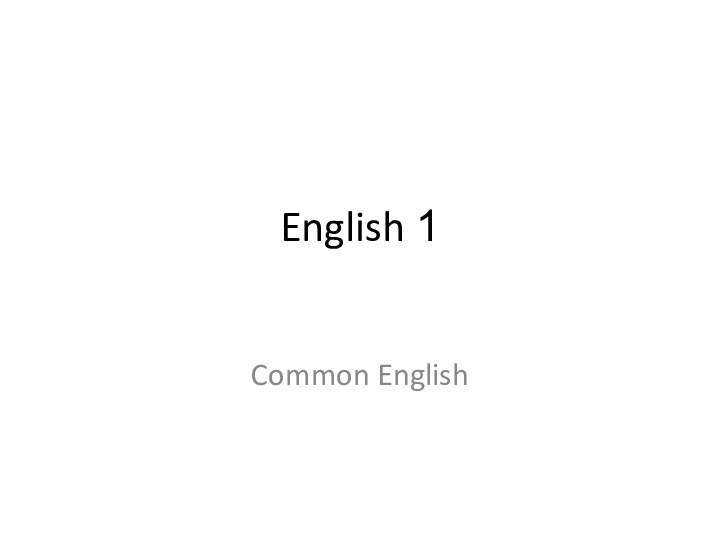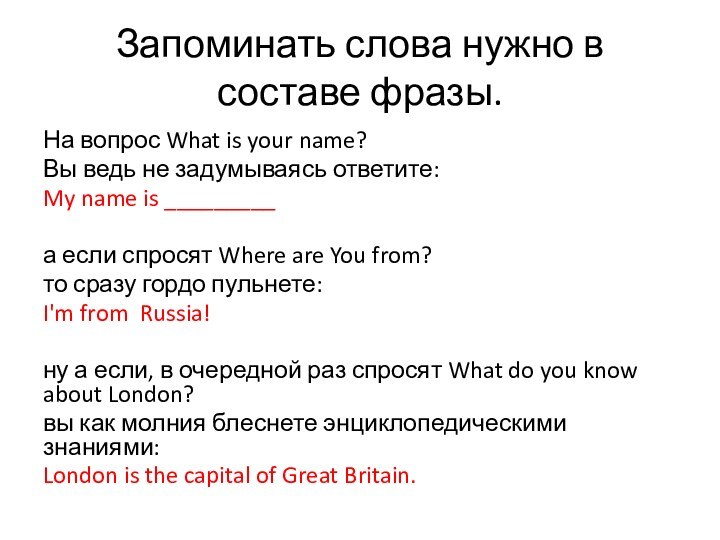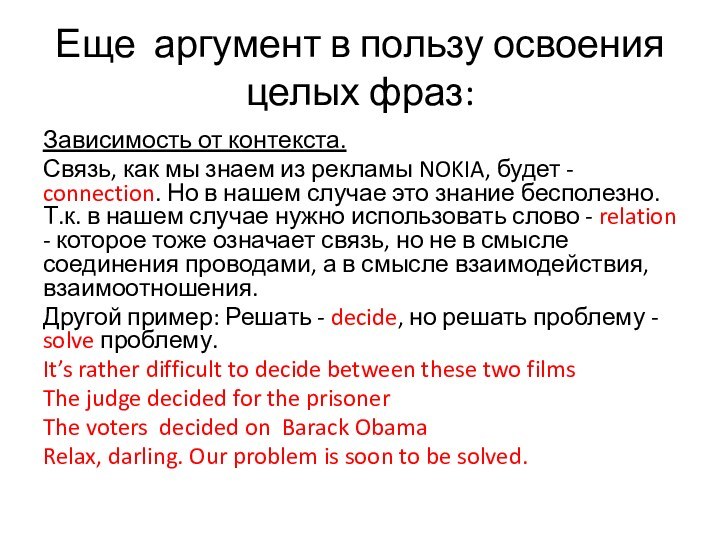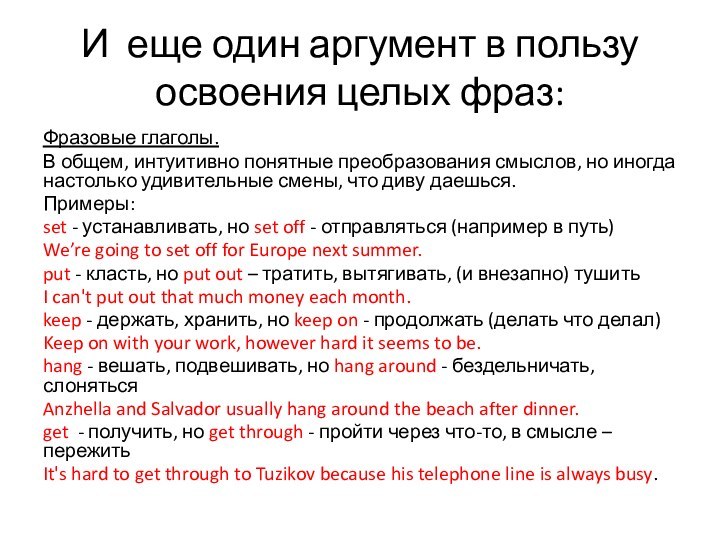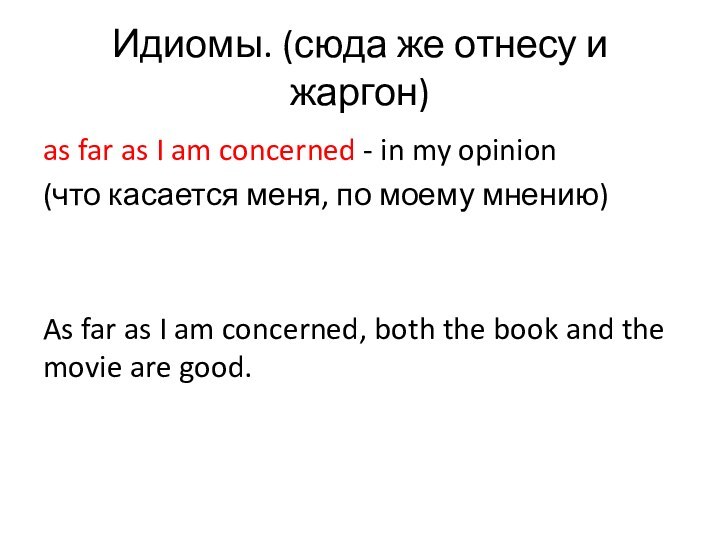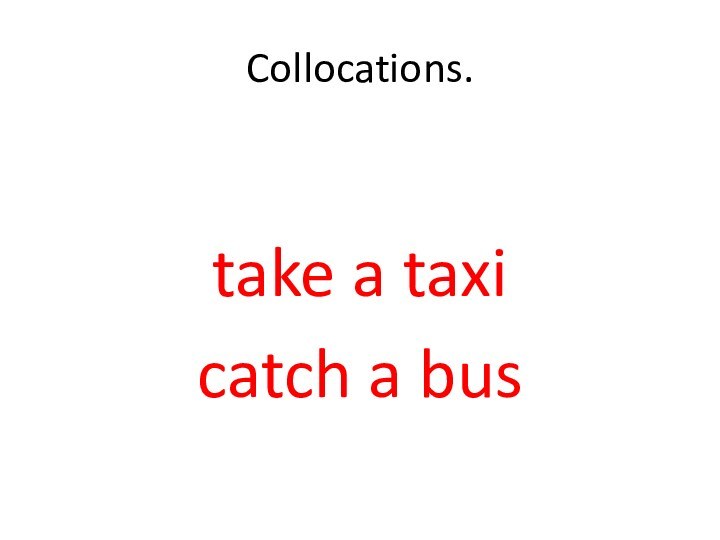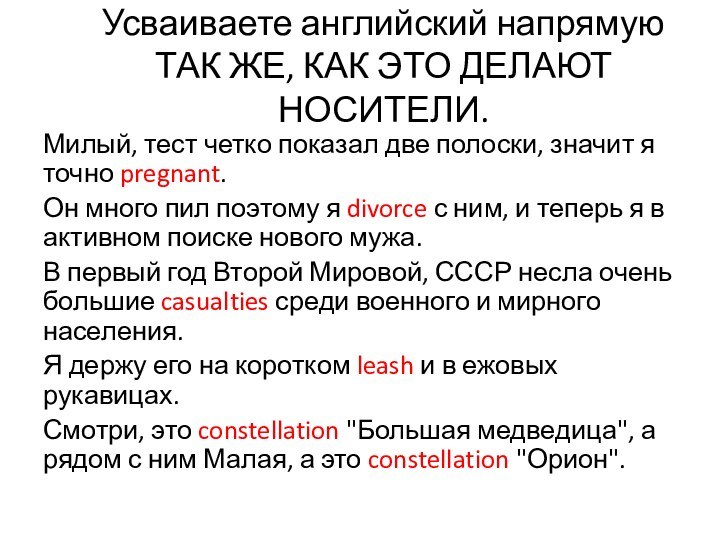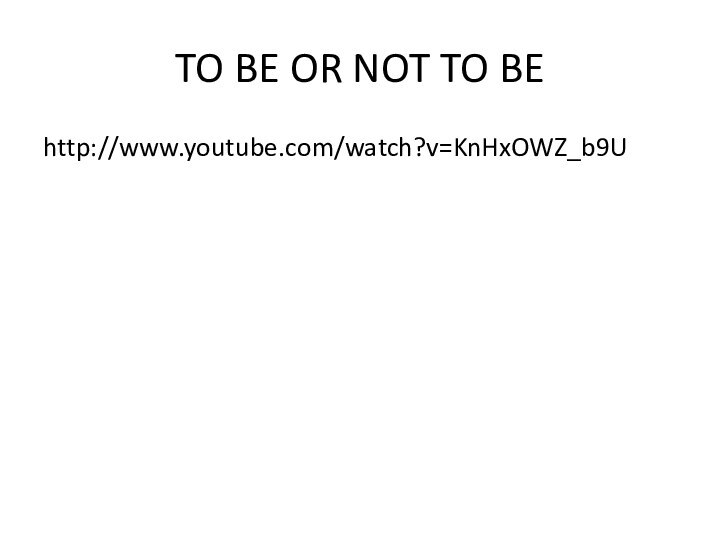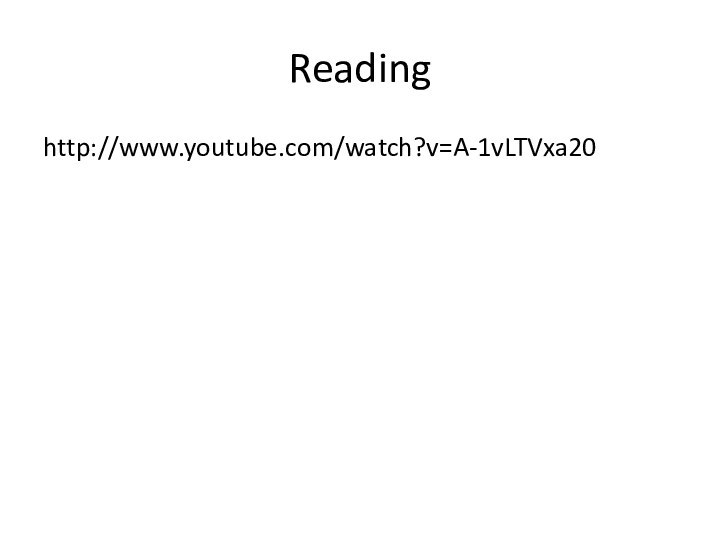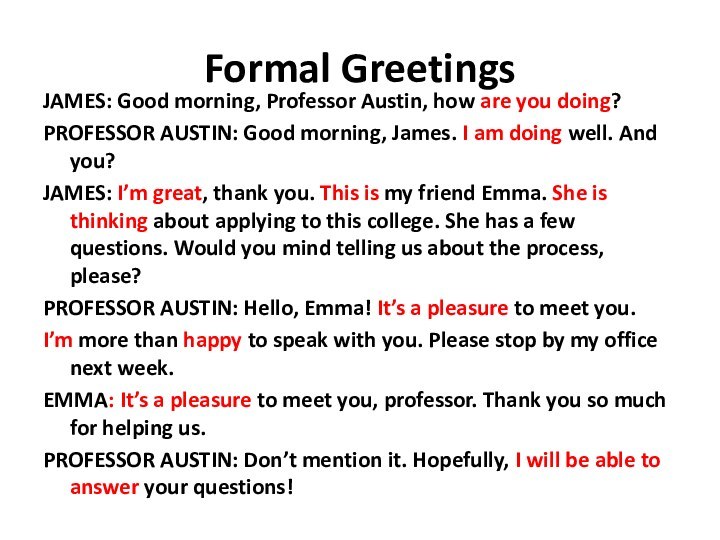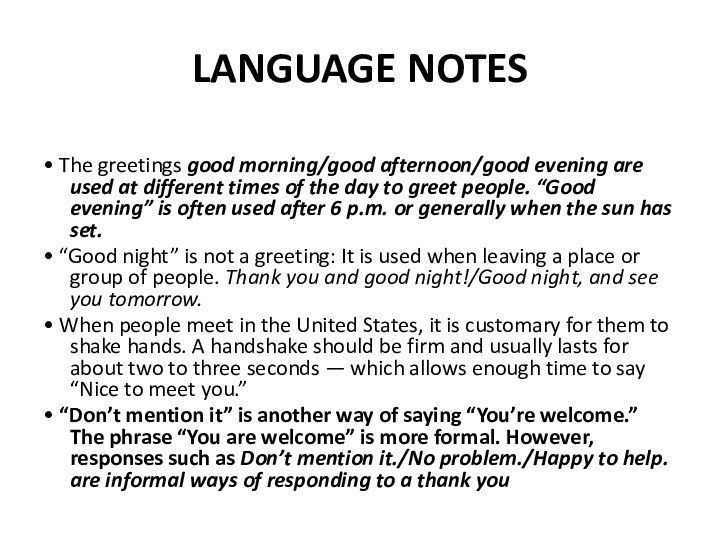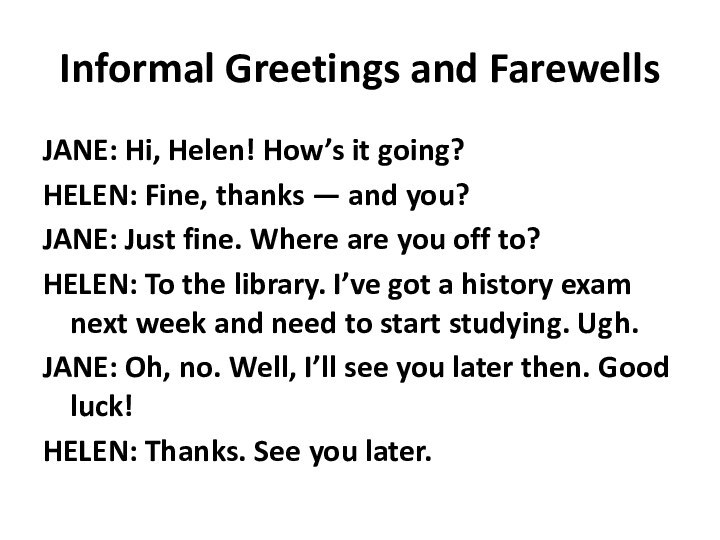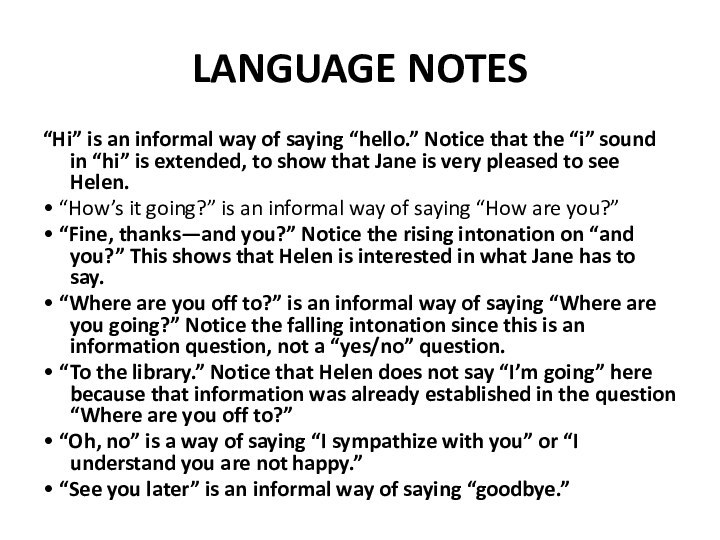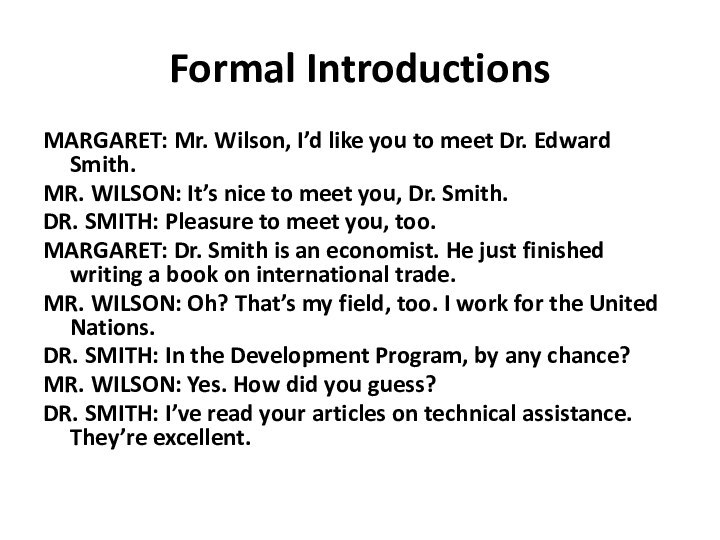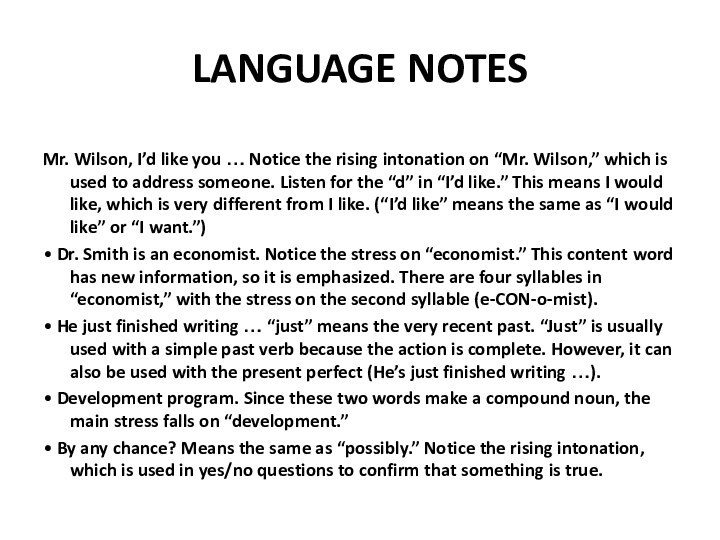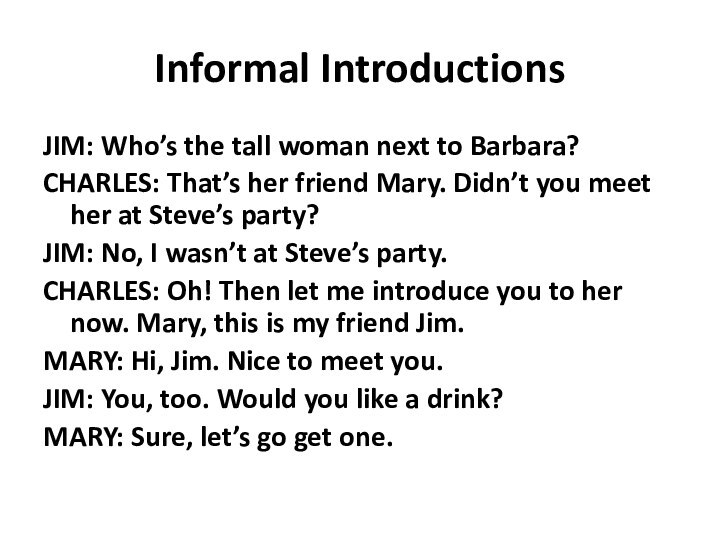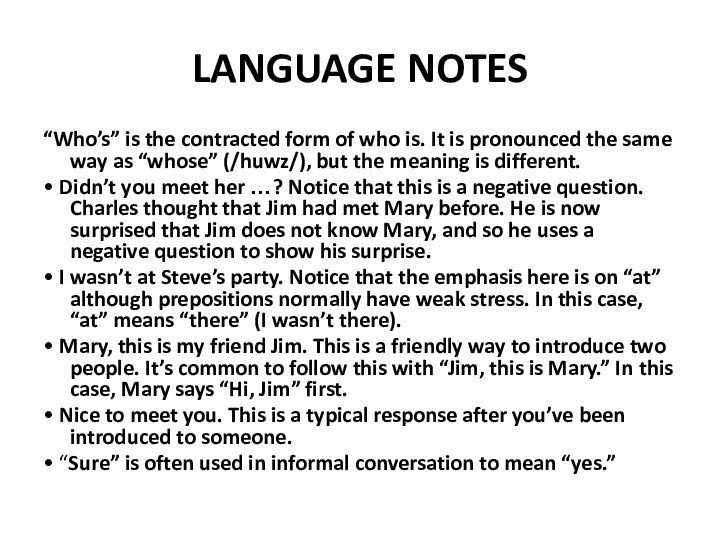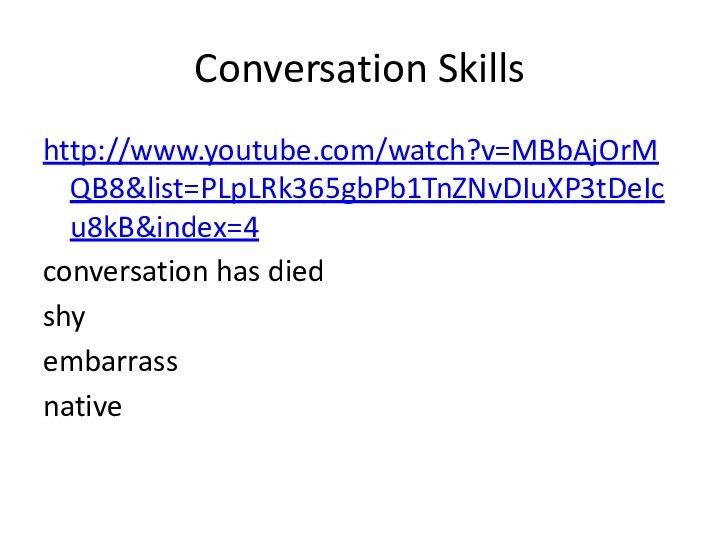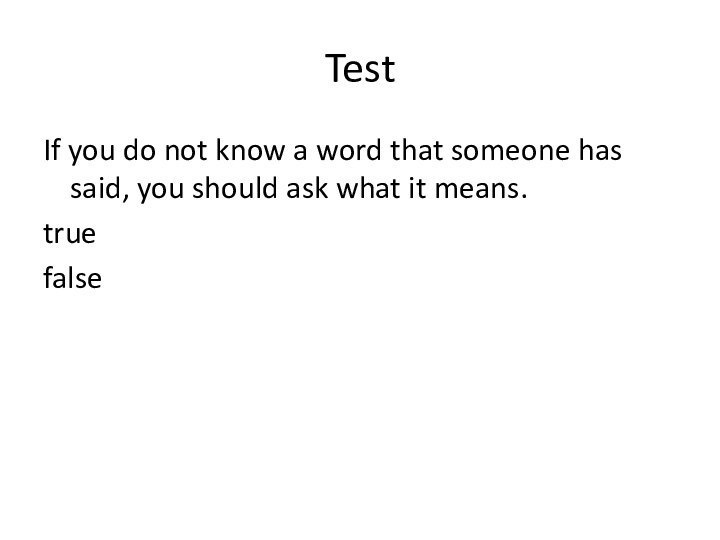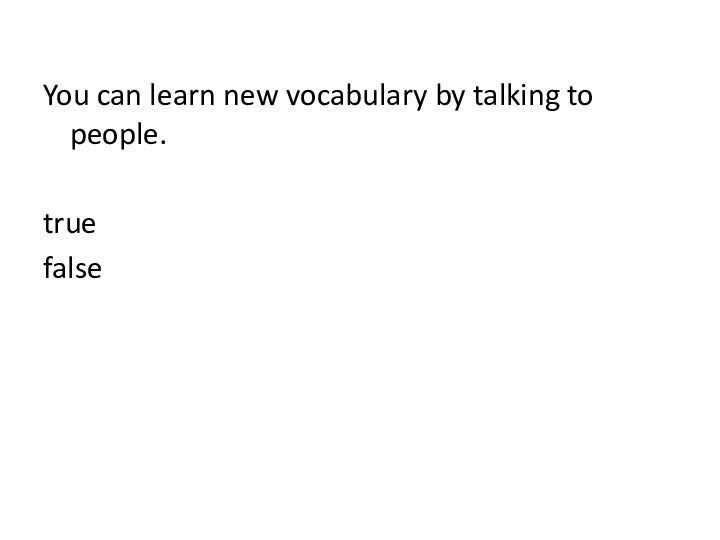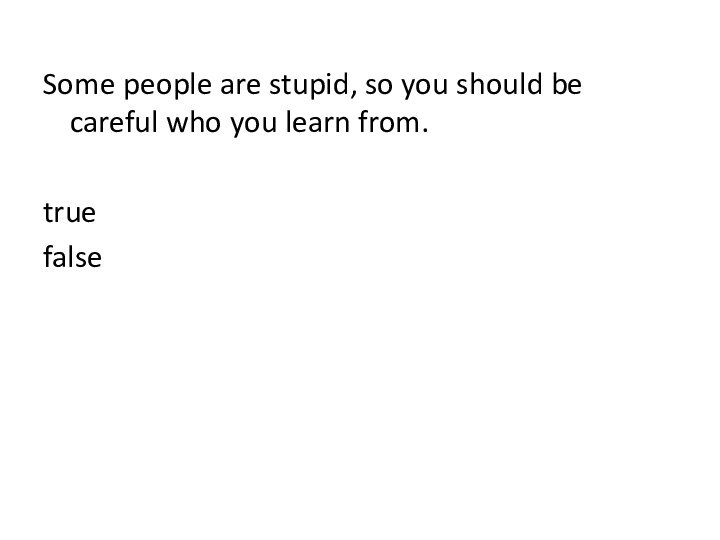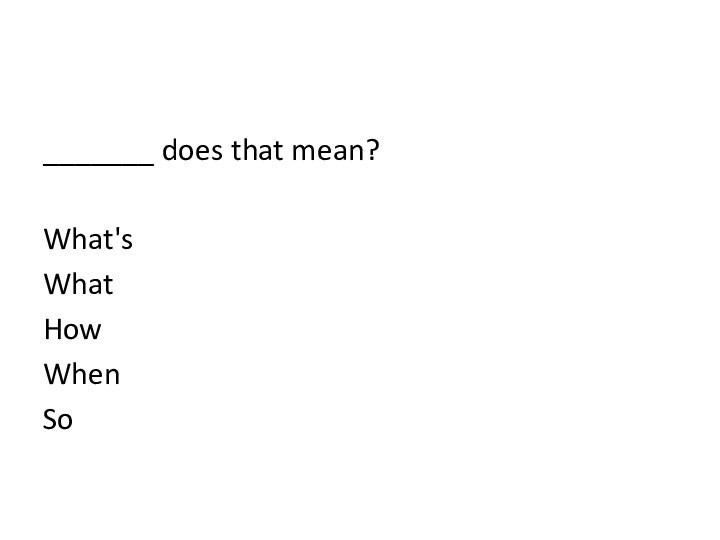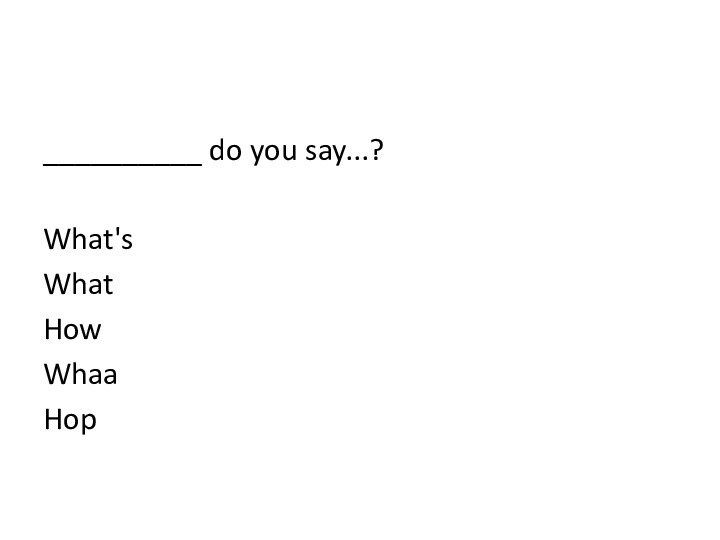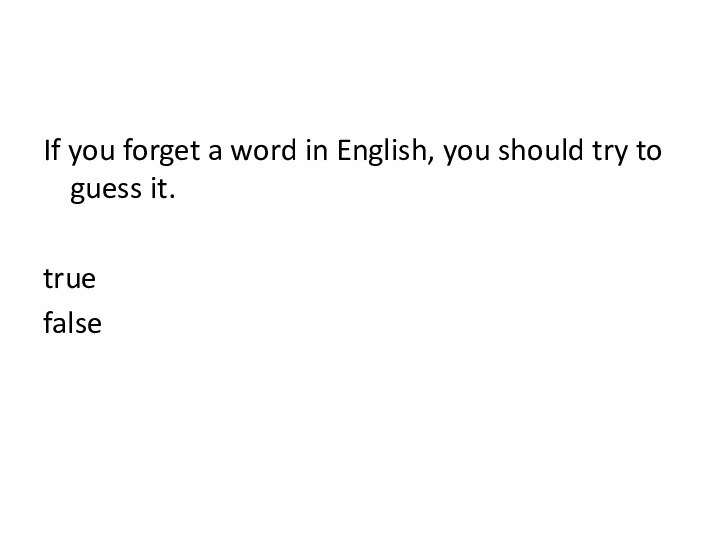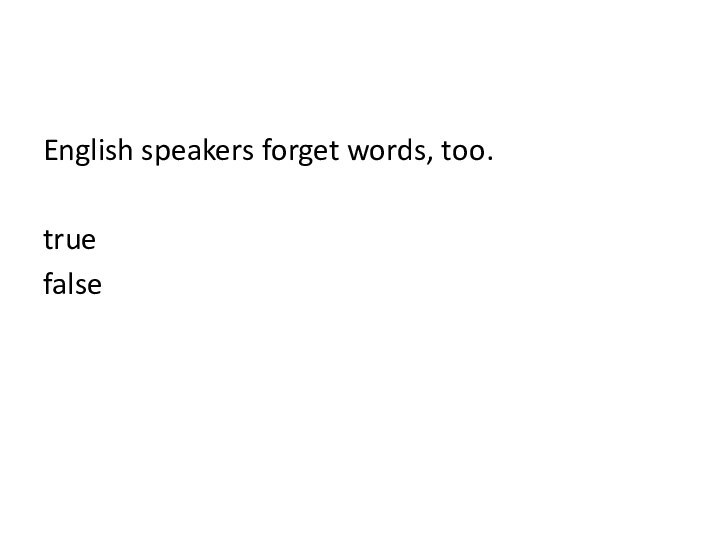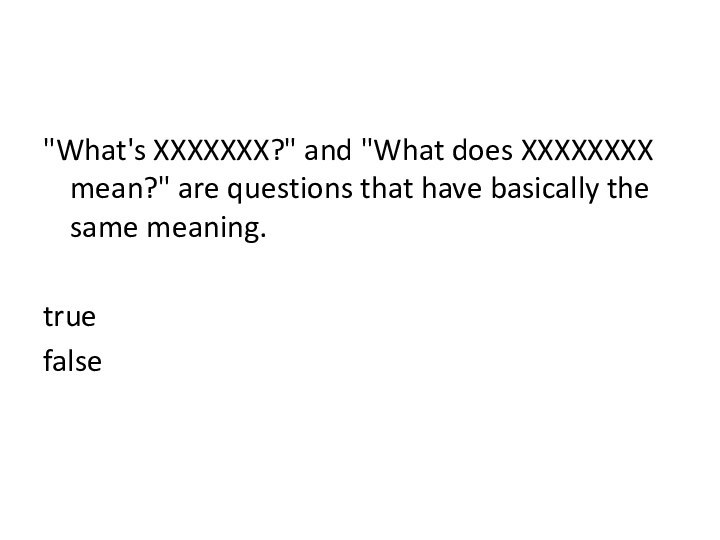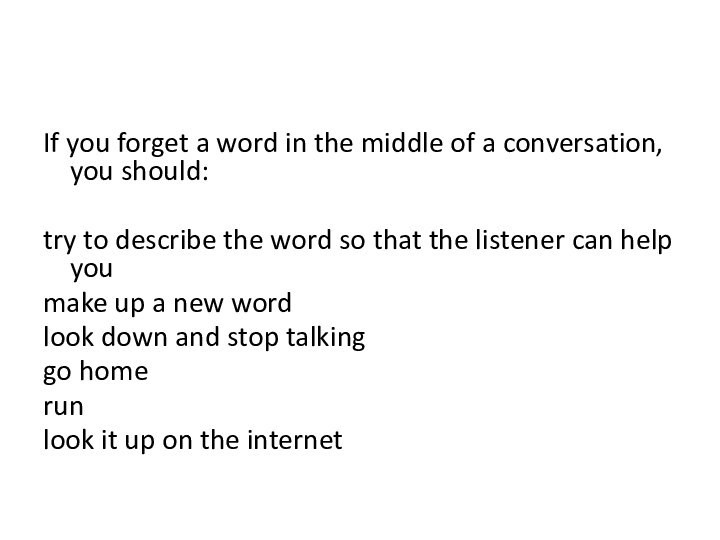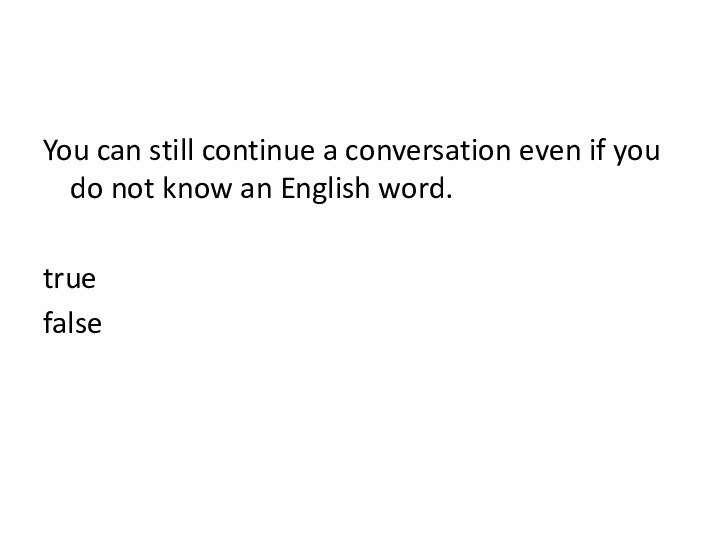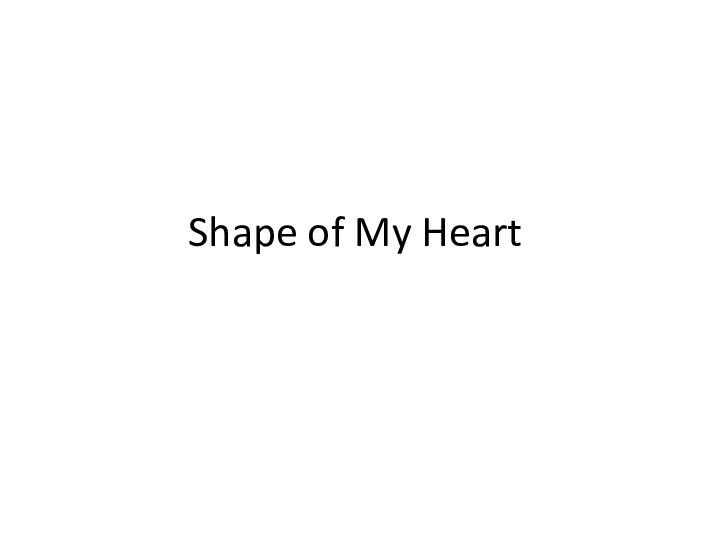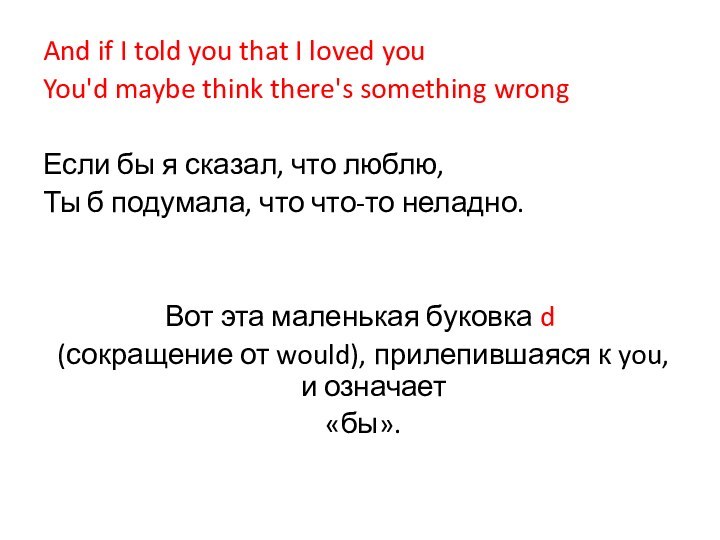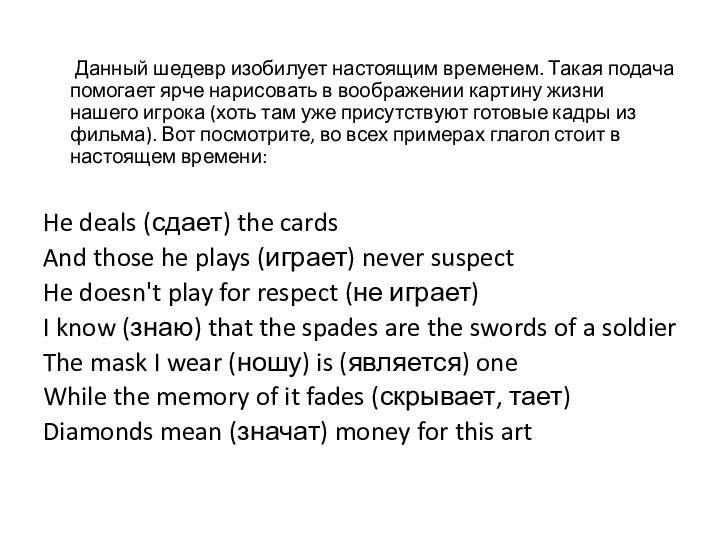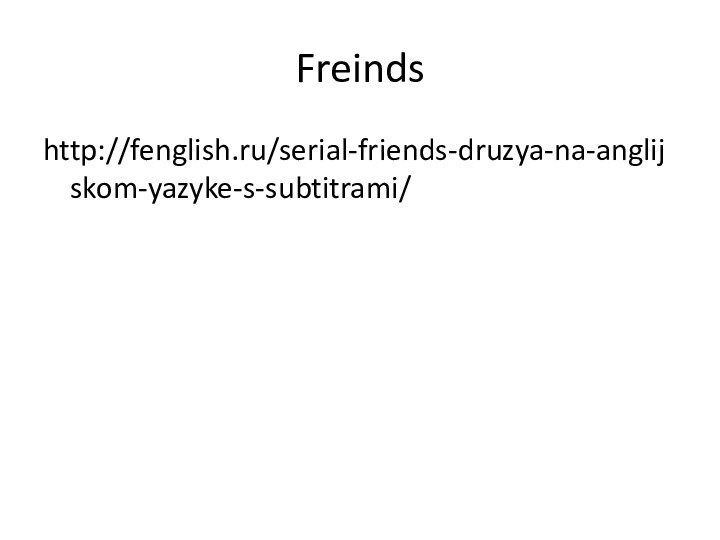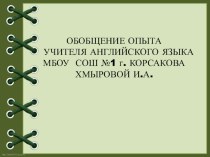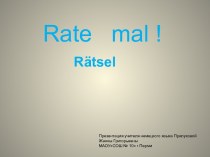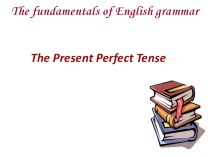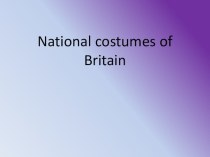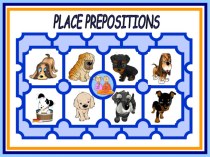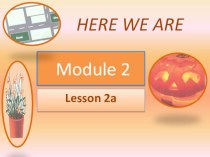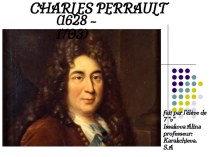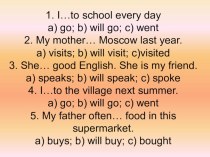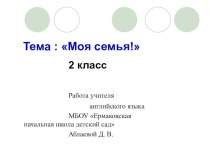Слайд 2
Запоминать слова нужно в составе фразы.
На вопрос What
is your name?
Вы ведь не задумываясь ответите:
My name is
_________
а если спросят Where are You from?
то сразу гордо пульнете:
I'm from Russia!
ну а если, в очередной раз спросят What do you know about London?
вы как молния блеснете энциклопедическими знаниями:
London is the capital of Great Britain.
Слайд 3
Еще аргумент в пользу освоения целых фраз:
Зависимость от
контекста.
Связь, как мы знаем из рекламы NOKIA, будет -
connection. Но в нашем случае это знание бесполезно. Т.к. в нашем случае нужно использовать слово - relation - которое тоже означает связь, но не в смысле соединения проводами, а в смысле взаимодействия, взаимоотношения.
Другой пример: Решать - decide, но решать проблему - solve проблему.
It’s rather difficult to decide between these two films
The judge decided for the prisoner
The voters decided on Barack Obama
Relax, darling. Our problem is soon to be solved.
Слайд 4
И еще один аргумент в пользу освоения целых
фраз:
Фразовые глаголы.
В общем, интуитивно понятные преобразования смыслов, но иногда
настолько удивительные смены, что диву даешься.
Примеры:
set - устанавливать, но set off - отправляться (например в путь)
We’re going to set off for Europe next summer.
put - класть, но put out – тратить, вытягивать, (и внезапно) тушить
I can't put out that much money each month.
keep - держать, хранить, но keep on - продолжать (делать что делал)
Keep on with your work, however hard it seems to be.
hang - вешать, подвешивать, но hang around - бездельничать, слоняться
Anzhella and Salvador usually hang around the beach after dinner.
get - получить, но get through - пройти через что-то, в смысле – пережить
It's hard to get through to Tuzikov because his telephone line is always busy.
Слайд 5
Идиомы. (сюда же отнесу и жаргон)
as far as
I am concerned - in my opinion
(что касается
меня, по моему мнению)
As far as I am concerned, both the book and the movie are good.
Слайд 6
Collocations.
take a taxi
catch a bus
Слайд 7
Усваиваете английский напрямую ТАК ЖЕ, КАК ЭТО ДЕЛАЮТ
НОСИТЕЛИ.
Милый, тест четко показал две полоски, значит я точно
pregnant.
Он много пил поэтому я divorce с ним, и теперь я в активном поиске нового мужа.
В первый год Второй Мировой, СССР несла очень большие casualties среди военного и мирного населения.
Я держу его на коротком leash и в ежовых рукавицах.
Смотри, это constellation "Большая медведица", а рядом с ним Малая, а это constellation "Орион".
Слайд 8
TO BE OR NOT TO BE
http://www.youtube.com/watch?v=KnHxOWZ_b9U
Слайд 9
Reading
http://www.youtube.com/watch?v=A-1vLTVxa20
Слайд 10
Formal Greetings
JAMES: Good morning, Professor Austin, how
are you doing?
PROFESSOR AUSTIN: Good morning, James. I am
doing well. And you?
JAMES: I’m great, thank you. This is my friend Emma. She is thinking about applying to this college. She has a few questions. Would you mind telling us about the process, please?
PROFESSOR AUSTIN: Hello, Emma! It’s a pleasure to meet you.
I’m more than happy to speak with you. Please stop by my office next week.
EMMA: It’s a pleasure to meet you, professor. Thank you so much for helping us.
PROFESSOR AUSTIN: Don’t mention it. Hopefully, I will be able to answer your questions!
Слайд 11
LANGUAGE NOTES
• The greetings good morning/good afternoon/good evening
are used at different times of the day to
greet people. “Good evening” is often used after 6 p.m. or generally when the sun has set.
• “Good night” is not a greeting: It is used when leaving a place or group of people. Thank you and good night!/Good night, and see you tomorrow.
• When people meet in the United States, it is customary for them to shake hands. A handshake should be firm and usually lasts for about two to three seconds — which allows enough time to say “Nice to meet you.”
• “Don’t mention it” is another way of saying “You’re welcome.” The phrase “You are welcome” is more formal. However, responses such as Don’t mention it./No problem./Happy to help. are informal ways of responding to a thank you
Слайд 12
Informal Greetings and Farewells
JANE: Hi, Helen! How’s
it going?
HELEN: Fine, thanks — and you?
JANE: Just fine.
Where are you off to?
HELEN: To the library. I’ve got a history exam next week and need to start studying. Ugh.
JANE: Oh, no. Well, I’ll see you later then. Good luck!
HELEN: Thanks. See you later.
Слайд 13
LANGUAGE NOTES
“Hi” is an informal way of saying
“hello.” Notice that the “i” sound in “hi” is
extended, to show that Jane is very pleased to see Helen.
• “How’s it going?” is an informal way of saying “How are you?”
• “Fine, thanks—and you?” Notice the rising intonation on “and you?” This shows that Helen is interested in what Jane has to say.
• “Where are you off to?” is an informal way of saying “Where are you going?” Notice the falling intonation since this is an information question, not a “yes/no” question.
• “To the library.” Notice that Helen does not say “I’m going” here because that information was already established in the question “Where are you off to?”
• “Oh, no” is a way of saying “I sympathize with you” or “I understand you are not happy.”
• “See you later” is an informal way of saying “goodbye.”
Слайд 14
Formal Introductions
MARGARET: Mr. Wilson, I’d like you
to meet Dr. Edward Smith.
MR. WILSON: It’s nice to
meet you, Dr. Smith.
DR. SMITH: Pleasure to meet you, too.
MARGARET: Dr. Smith is an economist. He just finished writing a book on international trade.
MR. WILSON: Oh? That’s my field, too. I work for the United Nations.
DR. SMITH: In the Development Program, by any chance?
MR. WILSON: Yes. How did you guess?
DR. SMITH: I’ve read your articles on technical assistance. They’re excellent.
Слайд 15
LANGUAGE NOTES
Mr. Wilson, I’d like you … Notice
the rising intonation on “Mr. Wilson,” which is used
to address someone. Listen for the “d” in “I’d like.” This means I would like, which is very different from I like. (“I’d like” means the same as “I would like” or “I want.”)
• Dr. Smith is an economist. Notice the stress on “economist.” This content word has new information, so it is emphasized. There are four syllables in “economist,” with the stress on the second syllable (e-CON-o-mist).
• He just finished writing … “just” means the very recent past. “Just” is usually used with a simple past verb because the action is complete. However, it can also be used with the present perfect (He’s just finished writing …).
• Development program. Since these two words make a compound noun, the main stress falls on “development.”
• By any chance? Means the same as “possibly.” Notice the rising intonation, which is used in yes/no questions to confirm that something is true.
Слайд 16
Informal Introductions
JIM: Who’s the tall woman next to
Barbara?
CHARLES: That’s her friend Mary. Didn’t you meet her
at Steve’s party?
JIM: No, I wasn’t at Steve’s party.
CHARLES: Oh! Then let me introduce you to her now. Mary, this is my friend Jim.
MARY: Hi, Jim. Nice to meet you.
JIM: You, too. Would you like a drink?
MARY: Sure, let’s go get one.
Слайд 17
LANGUAGE NOTES
“Who’s” is the contracted form of who
is. It is pronounced the same way as “whose”
(/huwz/), but the meaning is different.
• Didn’t you meet her …? Notice that this is a negative question. Charles thought that Jim had met Mary before. He is now surprised that Jim does not know Mary, and so he uses a negative question to show his surprise.
• I wasn’t at Steve’s party. Notice that the emphasis here is on “at” although prepositions normally have weak stress. In this case, “at” means “there” (I wasn’t there).
• Mary, this is my friend Jim. This is a friendly way to introduce two people. It’s common to follow this with “Jim, this is Mary.” In this case, Mary says “Hi, Jim” first.
• Nice to meet you. This is a typical response after you’ve been introduced to someone.
• “Sure” is often used in informal conversation to mean “yes.”
Слайд 18
Conversation Skills
http://www.youtube.com/watch?v=MBbAjOrMQB8&list=PLpLRk365gbPb1TnZNvDIuXP3tDeIcu8kB&index=4
conversation has died
shy
embarrass
native
Слайд 19
Test
If you do not know a word that
someone has said, you should ask what it means.
true
false
Слайд 20
You can learn new vocabulary by talking to
people.
true
false
Слайд 21
Some people are stupid, so you should be
careful who you learn from.
true
false
Слайд 22
_______ does that mean?
What's
What
How
When
So
Слайд 23
__________ do you say...?
What's
What
How
Whaa
Hop
Слайд 24
If you forget a word in English, you
should try to guess it.
true
false
Слайд 25
English speakers forget words, too.
true
false
Слайд 26
"What's XXXXXXX?" and "What does XXXXXXXX mean?" are
questions that have basically the same meaning.
true
false
Слайд 27
If you forget a word in the middle
of a conversation, you should:
try to describe the word
so that the listener can help you
make up a new word
look down and stop talking
go home
run
look it up on the internet
Слайд 28
You can still continue a conversation even if
you do not know an English word.
true
false
Слайд 30
And if I told you that I loved
you
You'd maybe think there's something wrong
Если бы я сказал,
что люблю,
Ты б подумала, что что-то неладно.
Вот эта маленькая буковка d
(сокращение от would), прилепившаяся к you, и означает
«бы».
Слайд 31
Данный шедевр изобилует настоящим
временем. Такая подача помогает ярче нарисовать в воображении картину
жизни нашего игрока (хоть там уже присутствуют готовые кадры из фильма). Вот посмотрите, во всех примерах глагол стоит в настоящем времени:
He deals (сдает) the cards
And those he plays (играет) never suspect
He doesn't play for respect (не играет)
I know (знаю) that the spades are the swords of a soldier
The mask I wear (ношу) is (является) one
While the memory of it fades (скрывает, тает)
Diamonds mean (значат) money for this art
